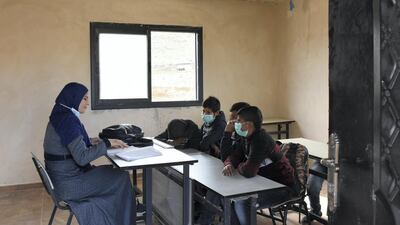Wearing a striped uniform and face mask, 14-year-old Noor Abu Rasheed said her grades have shot up since a school opened near her West Bank home. But with an Israeli demolition order looming over the building, she and dozens of other children could soon be kicked out of the classroom.
“My top subject is maths,” said the teenager, one of about 50 pupils at the remote Ras Al Tin school. Until the five classrooms were constructed earlier this year, children from local Bedouin communities had to walk up to seven kilometres to access education.

Noor said her grades were bad until recently. “When I came here all my tests improved,” she said, standing outside the single-storey school while sheep and donkeys grazed nearby.
With the long journey to school hindering pupils’ performance and attendance, herder communities got together in August and constructed their own classrooms using donated materials.
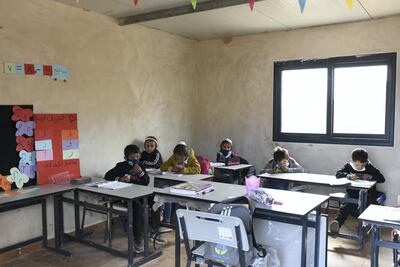
But even before the academic year started, Israeli officials drove down the dirt road and confiscated building materials and equipment such as chairs and tables.
Ras Al Tin lies north-east of Ramallah, in the part of the West Bank fully controlled by Israel. Cogat, the Israeli liaison agency to the Palestinian territories, said it responds to “planning and building violations” to maintain “public order and the rule of law”.
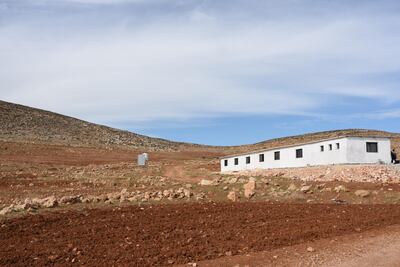
"Enforcement measures, as well as the confiscation of equipment at the location noted in your inquiry, are carried out in accordance with the authorities and procedures, and subject to priorities and operational considerations," Cogat told The National regarding Ras Al Tin.
According to the Israeli planning rights organisation Bimkom, authorities issued a demolition order for the school at Ras Al Tin on September 8.
While residents pressed on and finished the basic building work, they stopped short of installing electricity or running water over concerns such developments could prompt Israeli authorities to swiftly proceed with the demolition order.
A bathroom for the pupils remains unfinished, while a small hut a few metres from the school serves as the teachers’ toilet.
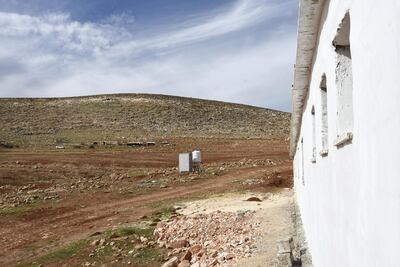
The head teacher, Noora Azhari, said the team of seven teachers was coping relatively well.
“The school is working in spite of the conditions, the infrastructure and such things,” she said, as the hubbub of classes could be heard behind her.
“There’s a good spirit among the teachers, the management and the students, of perseverance and giving, and everyone is happy,” Ms Azhari added.

Fifty-two schools in the occupied West Bank are currently under demolition orders, according to Bimkom. While Israeli authorities say they have been built without the necessary permits, the United Nations children’s agency notes such paperwork is very difficult to obtain.
"Many children in the State of Palestine face challenges claiming this right [to education], but those challenges faced by Bedouin children mean that they are potentially particularly vulnerable," Lucia Elmi, Unicef's special representative for Palestine, told The National.
With the lack of local schools or buses to take pupils elsewhere, she said some parents prefer to keep their children at home rather than risk them encountering Israeli soldiers or settlers during the long walk to school.
Residents of Ras Al Tin complained that settlers have started coming to the area and damaging their school.
“Every day they pass by, every day they come,” said Noor. “If the glass is broken and if they throw something we wait for an adult to come.”
With children attending the school from age six, there is not enough space to separate them into grades and so two levels share each classroom. While young pupils are busy fixing a paper moon and star to the wall of one room, in another Noor writes a maths equation on a whiteboard.
Most of the pupils and teachers wear face masks, a reminder of the coronavirus pandemic which has forced children around the world to take online classes.
Such remote study is impossible for the children of Ras Al Tin, said Alon Cohen Lifshitz from Bimkom.
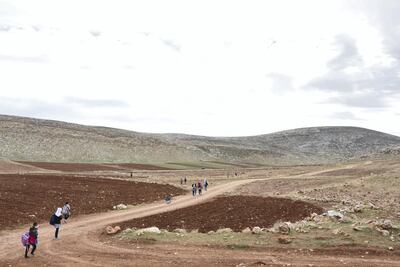
“They are not connected to the internet, of course they don’t have computers or laptops, so the only viable option for them is to build a physical school and to study here in this kind of way,” he said.
Lessons are carrying on despite the threat of the pandemic and the possibility that bulldozers may appear at any moment. The last West Bank school was demolished in 2015, according to Bimkom, although hundreds of other structures have been knocked down in recent years.
Between January and October this year, at least 111 homes in the West Bank were demolished by Israeli authorities, data from Israeli rights group B’Tselem show, in addition to 263 other structures such as storerooms.
In the largest forced displacement in more than four years, according to the UN, the homes of more than 70 Bedouins were razed on November 3.
In Ras Al Tin, Noor hopes the school will stand long enough for her to complete her education and allow other children to take her place.
The head teacher was uncertain whether the walls would stay standing, but remained determined that pupils will continue their studies even if the school is pulled down.
“We will go to another place and build a school, or we will continue in a tent,” said Ms Azhari.
“It’s impossible for us to stop, this is the children’s most basic right.”
